Ancient Eastern Philosophy
On the Ancient Wisdom of Buddhism, Hinduism, Taoism & Confucianism
 The
most important characteristic of the Eastern world view - one could
almost say the essence of it - is the awareness of the unity and mutual
interrelation of all things and events, the experience of all phenomena
in the world as manifestations of a basic oneness. All things are seen
as interdependent and inseparable parts of this cosmic whole; as different
manifestations of the same ultimate reality.
The
most important characteristic of the Eastern world view - one could
almost say the essence of it - is the awareness of the unity and mutual
interrelation of all things and events, the experience of all phenomena
in the world as manifestations of a basic oneness. All things are seen
as interdependent and inseparable parts of this cosmic whole; as different
manifestations of the same ultimate reality.
(Fritjof Capra,The Tao of Physics)
 The
fundamental element of the cosmos is Space. Space is the all-embracing
principle of higher unity. Nothing can exist without Space. .. According
to ancient Indian tradition the Universe reveals itself in two fundamental
properties: as Motion and as that in which motion takes
place, namely Space. This Space is called Akasa
.. derived from the root kas, 'to radiate, to shine', and has therefore
the meaning of ether which is conceived as the medium of movement. The
principle of movement, however, is Prana, the breath
of life, the all-powerful, all-pervading rhythm of the universe. (Lama
Anagarika Govinda, 1969)
The
fundamental element of the cosmos is Space. Space is the all-embracing
principle of higher unity. Nothing can exist without Space. .. According
to ancient Indian tradition the Universe reveals itself in two fundamental
properties: as Motion and as that in which motion takes
place, namely Space. This Space is called Akasa
.. derived from the root kas, 'to radiate, to shine', and has therefore
the meaning of ether which is conceived as the medium of movement. The
principle of movement, however, is Prana, the breath
of life, the all-powerful, all-pervading rhythm of the universe. (Lama
Anagarika Govinda, 1969)
Buddhism
On the Life of Buddha, Buddhist Thought & Practice
 Buddhism is a moral philosophy / religion based upon
the teachings of Siddhartha Gautama (566 - 486 B.C.).
Buddhism is a moral philosophy / religion based upon
the teachings of Siddhartha Gautama (566 - 486 B.C.).
Siddhartha Gautama became known as the Buddha. 'Buddha' (from the ancient
Indian languages of Pali and Sanskrit) means "one who has
awakened". It is derived from the verbal root "budh",
meaning "to awaken" or "to be enlightened", and "to
comprehend".
The Buddha offered metaphysical knowledge into the nature of reality as well as a moral way of life. The Middle Way is an important idea in Buddhist thought and practice. To seek moderation and avoid the extremes of self-indulgence and self-mortification.
At the age of 35, meditating under a Bodhi tree, Siddhartha reached Enlightenment, awakening to the true nature of reality, which is Nirvana (Absolute Truth);
The dustless and stainless Eye of Truth (Dhamma-cakkhu) has
arisen.
He has seen Truth, has attained Truth, has known Truth, has penetrated
into Truth, has crossed over doubt, is without wavering.
Thus with right wisdom he sees it as it is (yatha bhutam) ... The Absolute
Truth is Nibbana, which is Reality. (Buddha, from the Dhatuvibhanga-sutta
(No. 140) of the Majjhima-nikaya)
The Buddha taught that the nature of reality was impermanent and interconnected. We suffer in life because of our desire to transient things. Liberation from suffering may come by training the mind and acting according to the laws of karma (cause and effect) i.e. with right action, good things will come to you. This teaching is known as the Four Noble Truths:
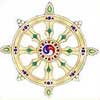 Dukkha:
Suffering is everywhere
Dukkha:
Suffering is everywhere
Samudaya: There is a cause of suffering, which is attachment
or misplaced desire (tanha) rooted in ignorance.
Nirodha: There is an end of suffering, which is Nirvana
(the possibility of liberation exists for everyone).
Maggo: There is a path that leads out of suffering, known
as the Noble Eightfold Path (right view, right thought, right speech, right
conduct, right vocation, right effort, right attention and right concentration).
The following quotes (from Buddha and others) express some of the main ideas of Buddhism;
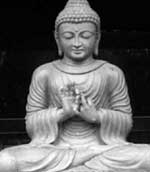 I
will teach you the Truth and the Path leading to the Truth. (Buddha)
I
will teach you the Truth and the Path leading to the Truth. (Buddha)
It is proper for you to doubt .. do not go upon report .. do not go upon tradition..do not go upon hearsay..' (Buddha, Kalama Sutra)
O Brahmana, it is just like a mountain river, flowing far and swift, taking everything along with it; there is no moment, no instant, no second when it stops flowing, but it goes on flowing and continuing. So Brahmana, is human life, like a mountain river. (Buddha)
‘Wherefore, brethren, thus must ye train yourselves : Liberation of the will through love will develop, we will often practice it, we will make it vehicle and base, take our stand upon it, store it up, thoroughly set it going.’ (Buddha)
From The Dhammapada;
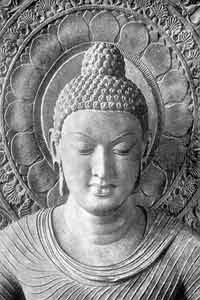 Not
to do any evil, to cultivate the good, to purify one’s mind, this
is the Teaching of the Buddhas.
Not
to do any evil, to cultivate the good, to purify one’s mind, this
is the Teaching of the Buddhas.
To speak no ill will, to do no harm, to practice self-restraint according to the fundamental precepts, to be moderate in eating, to live in seclusion, to devote oneself to higher consciousness, this is the Teaching of the Buddhas.
By endeavour, diligence, discipline and self-mastery, let the wise person make (of himself) an island that no flood can overwhelm.
All (mental) states have mind as their forerunner, mind is their chief, and they are mind-made. If one speaks or acts with a defiled mind, then suffering follows ..
Hatred is never appeased by hatred in this world; it is appeased by love. This is an eternal Law.
Hard to restrain, unstable is this mind; it flits wherever it lists. Good is it to control the mind. A controlled mind brings happiness.
'All conditioned things are impermanent’, when one sees this in wisdom, then one becomes dispassionate towards the painful. This is the Path to Purity.
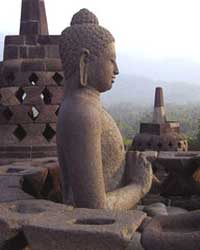 Buddhism
recognizes that humans have a measure of freedom of moral choice, and
Buddhist practice has essentially to do with acquiring the freedom to
choose as one ought to choose with truth: that is of acquiring a freedom
from the passions and desires that impel us to distraction and poor
decisions. (Walpola Rahula, What the Buddha Taught)
Buddhism
recognizes that humans have a measure of freedom of moral choice, and
Buddhist practice has essentially to do with acquiring the freedom to
choose as one ought to choose with truth: that is of acquiring a freedom
from the passions and desires that impel us to distraction and poor
decisions. (Walpola Rahula, What the Buddha Taught)
Buddhism stands unique in the history of human thought in denying the existence of such a Soul, Self, or Atman. According to the teaching of the Buddha, the idea of self is imaginary, false belief which has no corresponding reality, and it produces harmful thoughts of ‘me’ and ‘mine’, selfish desire, craving, attachment, hatred, ill-will, conceit, pride, egoism, and other defilements, impurities and problems. It is the source of all the troubles in the world from personal conflicts to wars between nations. (Rahula)
The theory of karma is the theory of cause and effect, of action and reaction; it is a natural law, which has nothing to do with the idea of justice or reward and punishment. Every volitional action produces its effects or results. If a good action produces good effects, it is not justice, or reward, meted out by anybody or any power sitting in judgement of your action, but this is in virtue of its own nature, its own law. (Rahula)
For the first time in the history of the world, Buddhism proclaimed a salvation which each individual could gain from him or herself, in this world, during this life, without any least reference to God, or to gods either great or small. (Aldous Huxley)
See our webpage Buddha Nirvana / Buddhism Religion for more pictures, information and quotes on Karma, Truth, the Dynamic Unity of Reality, Buddha's conception of Mind and Matter, The Four Noble Truths and the Eightfold Path, Anatta (No Soul) and Conditioned Genesis (Paticca-samuppada).
Hinduism
On the Metaphysics & Philosophy of Hinduism
Beliefs & Hindu Gods
All is One (Brahman)
 The
first collection of Indian philosophy that was written down was the
Vedas. The word 'Veda' comes from the Sanskrit vid,
meaning knowledge - the Vedas are 'sacred knowledge'. Their exact date
is controversial, it is possible that the knowledge dates back 10,000
years BC, and were first written around 3,000 BC.
The
first collection of Indian philosophy that was written down was the
Vedas. The word 'Veda' comes from the Sanskrit vid,
meaning knowledge - the Vedas are 'sacred knowledge'. Their exact date
is controversial, it is possible that the knowledge dates back 10,000
years BC, and were first written around 3,000 BC.
The metaphysical foundation of Hinduism, which is expressed in both the Vedas and the Upanishads is that Reality (Brahman) is One or Absolute, changeless, perfect and eternal. The ordinary human world of many separate and discrete (finite) things (which our mind represents by our senses) is an illusion. Through meditation and purity of mind, one can experience their true Self which is Brahman, God, the One infinite eternal thing which causes and connects the many things. True enlightenment is Self-realisation, to experience the supreme reality as Self.
The following mantra and quotes express the aspirations of Hinduism religion;
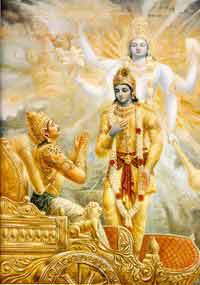 OM
Asato ma sadgamaya, tamaso ma jyotirgamaya, mrityor mamritam gamaya
OM
Asato ma sadgamaya, tamaso ma jyotirgamaya, mrityor mamritam gamaya
" OM Lead me from falsehood to truth, from darkness to light, from death
to immortality."
Though One, Brahman is the cause of the many.
Brahman is the unborn (aja) in whom all existing things abide. The One
manifests as the many, the formless putting on forms. (Rig Veda)
Behold but One in all things; it is the second that leads you astray. (Kabir)
The word Brahman means growth and is suggestive of life, motion, progress. (Radhakrishnan)
Hindu cosmology is non-dualistic. Everything that is is Brahman. Brahman is the eternal Now, and in eternity there is no before or after, for everything is everywhere, always. To use the words of Pascal 'it is a circle the center of which is everywhere and the circumference nowhere.' (Sudhakar S.D, 1988)
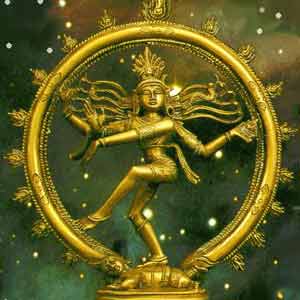 In
Indian philosophy, the main terms used by Hindus and Buddhists have
dynamic connotations. The word Brahman is derived from the Sanskrit
root brih - to grow- and thus suggests a reality which is dynamic and
alive. The Upanishads refer to Brahman as 'this unformed, immortal,
moving', thus associating it with motion even though it transcends all
forms.' The Rig Veda uses another term to express the dynamic character
of the universe, the term Rita. This word comes from the root ri- to
move. In its phenomenal aspect, the cosmic One is thus intrinsically
dynamic, and the apprehension of its dynamic nature is basic to all
schools of Eastern mysticism.
In
Indian philosophy, the main terms used by Hindus and Buddhists have
dynamic connotations. The word Brahman is derived from the Sanskrit
root brih - to grow- and thus suggests a reality which is dynamic and
alive. The Upanishads refer to Brahman as 'this unformed, immortal,
moving', thus associating it with motion even though it transcends all
forms.' The Rig Veda uses another term to express the dynamic character
of the universe, the term Rita. This word comes from the root ri- to
move. In its phenomenal aspect, the cosmic One is thus intrinsically
dynamic, and the apprehension of its dynamic nature is basic to all
schools of Eastern mysticism.
They all emphasize that the universe has to be grasped dynamically, as
it moves, vibrates and dances. ..The Eastern mystics see the universe as
an inseparable web, whose interconnections are dynamic and not static.
The cosmic web is alive; it moves and grows and changes continually. (Fritjof
Capra, 1972.)
In Hinduism, Shiva the Cosmic Dancer, is perhaps the most perfect personification of the dynamic universe. Through his dance, Shiva sustains the manifold phenomena in the world, unifying all things by immersing them in his rhythm and making them participate in the dance - a magnificent image of the dynamic unity of the Universe. (Capra, The Tao of Physics)
For a more detailed explanation of the Metaphysics of Hinduism and the Wave Structure of Matter, see the webpage Hinduism / Hindu Gods
Taoism
Way of the Tao, Lao Tzu
 There
is a thing, formless yet complete. Before heaven and earth it existed.
Without sound, without substance, it stands alone and unchanging. It
is all-pervading and unfailing. We do not know its name, but we call
it Tao. .. Being one with nature, the sage is in accord with the Tao.
(Lao Tzu)
There
is a thing, formless yet complete. Before heaven and earth it existed.
Without sound, without substance, it stands alone and unchanging. It
is all-pervading and unfailing. We do not know its name, but we call
it Tao. .. Being one with nature, the sage is in accord with the Tao.
(Lao Tzu)
Taoism is one of the great religions / philosophies of Ancient
China (along with Buddhism and Confucianism).
In 440 B.C. Taoism was adopted as a state religion of China, with Lao Tzu
(so called founder of Taoism) honoured as a deity. Lao Tzu was a contemporary
of Confucius and wrote a book called the Tao te Ching, composed some time
between the sixth and third centuries B.C. Some people believe Lao Tzu
is a mythical character. State support of Taoism ended in 1911 with the
end of the Ch'ing Dynasty and much Taoist heritage was destroyed.
Tao (pronounced 'Dao') can be defined as 'path',
or 'road'. The way of the Tao is the way of Nature
and of ultimate reality. Tao is often described as a force that flows
through all life. A happy and virtuous life is one that is in harmony
with the Tao, with Nature.
The philosophy of Taoism understands Tao as the One Thing which exists
and connects the Many things. Tao, Nature, Reality are One.
The following quotes (attributed to Lao Tzu) help us understand the nature of the Tao;
“If people do not revere the Law of Nature, It will
inexorably and adversely affect them
If they accept it with knowledge and reverence, It will accommodate them
with balance and harmony.”
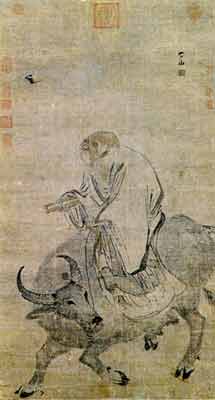 “There
is a thing, formless yet complete.
“There
is a thing, formless yet complete.
Before heaven and earth it existed.
Without sound, without substance,
it stands alone and unchanging.
It is all-pervading and unfailing.
One may think of it as the mother of all beneath Heaven.
We do not know its name, but we call it Tao.
Deep and still, it seems to have existed forever.”
“The Great Tao flows everywhere.
It may go left or right.
All things depend on it for life, and it does not turn away from them.
It accomplishes its tasks, but does not claim credit for it.
It clothes and feeds all things, but does not claim to be master over
them.
Always without desires, it may be called the Small.
All things come to it and it does not master them;
it may be called The Great.”
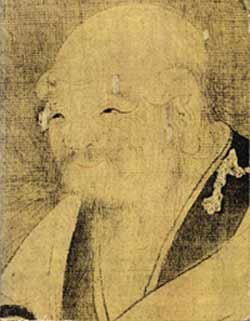 “The
Tao that can be told of is not the eternal Tao;
“The
Tao that can be told of is not the eternal Tao;
the name that can be named is not the eternal name.”
“Hold on to the Tao of old in order to master the things of the present.”
“Being one with Nature, he is in accord with the Tao.
Being in accord with the Tao, he is everlasting.”
“Whether it is big or small, many or few, repay hatred with virtue.”
”Manifest plainness, Embrace simplicity, Reduce selfishness, Have few desires.”
“Be still like a mountain and flow like a great river.” (Lao Tzu)
See our webpage Taoism / Philosophy of the Tao for more quotes, information, history and pictures.
Confucianism
On the Life of Confucius & the Philosophy of Confucianism
Confucianism is an ethical and philosophical system based upon the teachings of the Chinese sage, Confucius.
 Confucius
was a famous thinker and social philosopher of China, whose teachings
have deeply influenced East Asia for centuries. Living in the Spring
and Autumn period (a time when feudal states fought against each other),
he was convinced of his ability to restore the world's order, though
failed. After much travelling around China to promote his ideas among
rulers, he eventually became involved in teaching disciples. His philosophy
emphasized personal and governmental morality, correctness of social
relationships, and justice and sincerity. Used since then as the imperial
orthodoxy, Confucius' thoughts have been developed into a vast and complete
philosophical system known in the west as Confucianism.
Confucius
was a famous thinker and social philosopher of China, whose teachings
have deeply influenced East Asia for centuries. Living in the Spring
and Autumn period (a time when feudal states fought against each other),
he was convinced of his ability to restore the world's order, though
failed. After much travelling around China to promote his ideas among
rulers, he eventually became involved in teaching disciples. His philosophy
emphasized personal and governmental morality, correctness of social
relationships, and justice and sincerity. Used since then as the imperial
orthodoxy, Confucius' thoughts have been developed into a vast and complete
philosophical system known in the west as Confucianism.
The Analects is a short collection of his discussions with disciples, compiled posthumously. These contain an overview of his teachings. Confucius presents himself as a transmitter who invented nothing and his greatest emphasis may be on study, the Chinese character that opens the book. In this respect, he is seen by Chinese people as the Greatest Master. Far from trying to build a systematic theory of life and society, he wanted his disciples to think deeply for themselves and relentlessly study the outside world. For almost two thousand years, Analects had also been the fundamental course of study for any Chinese scholar, for a man was not considered morally upright or enlightened if he did not study Confucius' works.
Based upon https://en.wikipedia.org/wiki/Confucius
The following quotes from The Analects demonstrate the simplicity and wisdom of Confucianism;
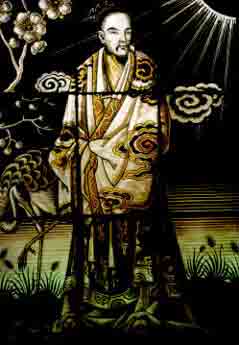 “
Hold faithfulness and sincerity as first principles.”
“
Hold faithfulness and sincerity as first principles.”
“ I am not one who was born in the possession of knowledge; I am one who is fond of antiquity, and earnest in seeking it there.”
“ Everything has its beauty but not everyone sees it.”
“ Forget injuries, never forget kindnesses.”
“ Men's natures are alike, it is their habits that carry them far apart.”
“ Respect yourself and others will respect you.”
“ Study the past if you would define the future.”
“ To see what is right, and not to do it, is want of courage or of principle.”
“ What the superior man seeks is in himself; what the small man seeks is in others.”
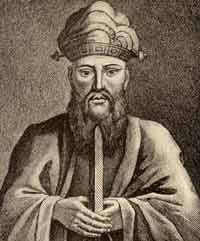 “
When anger rises, think of the consequences.”
“
When anger rises, think of the consequences.”
“ When we see men of a contrary character, we should turn inwards and examine ourselves.”
“ Wheresoever you go, go with all your heart.”
“ They must often change who would be constant in happiness or wisdom.”
“ Fine words and an insinuating appearance are seldom associated with true virtue.”
“ Have no friends not equal to yourself.”
“ If a man takes no thought about what is distant, he will find sorrow near at hand.”
See our webpage Confucius / Confucianism for more pictures, quotes and information.
Theology
Summary & History of World Religions. On Morality, Free Will & God
Help Humanity
"You must be the change you wish to see in the world."
(Mohandas Gandhi)
 "When forced to summarize the general theory of relativity in one sentence:
Time and space and gravitation have no separate existence from matter. ... Physical objects are not in space, but these objects are spatially extended. In this way the concept 'empty space' loses its meaning. ... The particle can only appear as a limited region in space in which
the field strength or the energy density are particularly high. ...
"When forced to summarize the general theory of relativity in one sentence:
Time and space and gravitation have no separate existence from matter. ... Physical objects are not in space, but these objects are spatially extended. In this way the concept 'empty space' loses its meaning. ... The particle can only appear as a limited region in space in which
the field strength or the energy density are particularly high. ...
The free, unhampered exchange of ideas and scientific conclusions is necessary for the sound development of science, as it is in all spheres
of cultural life. ... We must not conceal from ourselves that no improvement in the present depressing situation is possible without
a severe struggle; for the handful of those who are really determined to do something is minute in comparison with the mass of the lukewarm
and the misguided. ...
Humanity is going to need a substantially new way of thinking if it is to survive!" (Albert Einstein)
 Our world is in great trouble due to human behaviour founded on myths and customs that are causing the destruction of Nature and climate change. We can now deduce the most simple science theory of reality - the wave structure of matter in space. By understanding how we and everything around us are interconnected
in Space we can then deduce solutions to the fundamental problems of human knowledge in physics, philosophy, metaphysics, theology, education, health, evolution and ecology, politics and society.
Our world is in great trouble due to human behaviour founded on myths and customs that are causing the destruction of Nature and climate change. We can now deduce the most simple science theory of reality - the wave structure of matter in space. By understanding how we and everything around us are interconnected
in Space we can then deduce solutions to the fundamental problems of human knowledge in physics, philosophy, metaphysics, theology, education, health, evolution and ecology, politics and society.
This is the profound new way of thinking that Einstein
realised, that we exist as spatially extended structures of the universe - the discrete and separate body an illusion. This simply confirms the
intuitions of the ancient philosophers and mystics.
Given the current censorship in physics / philosophy of science journals (based on the standard model of particle physics / big bang cosmology) the internet is the best hope for getting new knowledge
known to the world. But that depends on you, the people who care about science and society, realise the importance of truth and reality.
It is Easy to Help!
Just click on the Social Network links below, or copy a nice image or quote you like and share it. We have a wonderful collection of knowledge from the greatest minds in human history, so people will appreciate your contributions. In doing this you will help a new generation of scientists see that there is a simple sensible explanation of physical reality - the source of truth and wisdom, the only cure for the madness of man! Thanks! Geoff Haselhurst (Updated September, 2018)
A new scientific truth does not triumph by convincing its opponents and making them see the light, but rather because its opponents eventually die, and a new generation grows up that is familiar with it. (Max Planck, 1920)
| Tweet Follow @philosophytruth | |
| Geoff | |
Connect with Geoff Haselhurst at Facebook
"All that is necessary for evil to succeed is for good people to do nothing."
(Edmund Burke)
"In a time of universal deceit - telling the truth is a revolutionary act."
(George Orwell)
"Hell is Truth Seen Too Late."
(Thomas Hobbes)
Legal Disclaimer and Privacy Policy





























